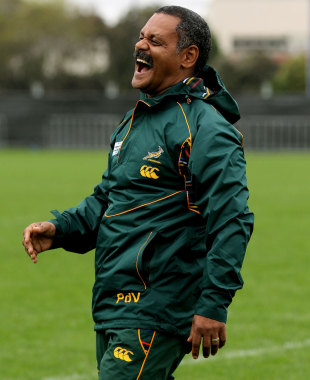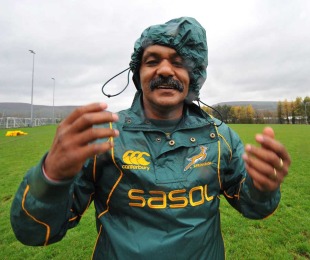|
South African Rugby
Method in the madness?
Tom Hamilton
June 19, 2012

Peter de Villiers enjoyed a mixed tenure as Springboks boss and was never shy from the front or back pages of the newspapers
© Getty Images
Enlarge
"Unto thine own self be true" Polonius' statement in Act 1 Scene III of Hamlet has been used the world over but few can hold claim to this phrase as Peter de Villiers does. The much-maligned, sometimes infuriating, unpredictable and wonderfully unique former Springboks coach's survival instincts kicked in the minute he got the job. When De Villiers was awarded the Springboks role back in 2008 it was a historic moment for South African sport. The ever-present influence of race, running from the top of South African politics right down to the township of Soweto, dominated De Villiers' tenure. From the outset it was clear that his time in charge of the Springboks would never be shy from the front or back pages of the South African press when SARU CEO Oregon Hoskins said of De Villiers' appointment: "I want to be honest with South Africa and say that the appointment was not entirely made for rugby reasons". Talking to De Villiers is an interesting experience to say the least, the man who recently proclaimed himself the 'Mandela of rugby'. Straight questions are met with obtuse answers riddled with parable and metaphor. Contrast that with the beautifully penned autobiography Politically Incorrect - ghosted by one of his biggest critics Gavin Rich - and you are met with an enigma. During his tenure as Boks coach, when asked about Schalk Burger's infamous gouging of Luke Fitzgerald, his answer referred to ballet - a comment that led to Hoskins issuing an apology on De Villiers' behalf. When Ricky Januarie's form was questioned, journalists were met with a comparison involving a mechanic. It would be an understatement to suggest that his relationship with the press was stretched at times with media opportunities sometimes reduced to madcap analogies rather than rugby fibre. De Villiers remains adamant that he played the press in the right way and, although he admits he was misinterpreted, he absolves himself of blame. "I have no regrets," De Villiers told ESPN. "A lot of people don't pass the exams because you can't read the questions but you understand the questions. A lot of these journalists are lazy buggers - they want you to give an answer so that they can take it and write it their way. They don't want to think, they don't want to work and even if there's something they don't understand then they don't ask - they just want other people to do it for them. "What I've found about journalists in this country and perhaps elsewhere is that none of them - none of them - played for the school's first team so how the devil can they challenge me on rugby? They come along with a story they have written two days ago looking for the wording and if you don't give it to them - then they will write it anyway. If you compare the book to the newspaper then you understand me much better from the book - the newspapers are written to be sold. "They don't care if they kill people's character. If you put people in jail for killing other people's character then there will be only a few people left walking on the earth. No people who are true to themselves can become journalists." It seems to be a lonely existence being De Villiers; during his tenure he alienated press and organisations and, according to his book, some of those he trusted let him down. This is only one side of the argument and when asked about what he learned in his time as Boks coach, De Villiers is typically bullish. "I learnt a huge lesson - you can't go out there and trust people, you can't even trust your own family. That's why God is so good - he never gave you the opportunity to see into the hearts of people - look at you - you ask that question sounding so genuine but how do I know what you want to achieve out of it? "I can't control the people around me but I can be just to my own cause and looking back, I can be very proud of who I am and I also had a bunch of people in the coaching team who I trusted and we brought hope to a lot of people and I think we should build on those foundations that we laid." Results-wise, De Villiers' tenure failed to live up to the standards set by his predecessor Jake White who departed from the SARU with a World Cup winner's medal in his brown cardboard box. De Villiers' global gathering finished in a quarter-final but prior to this, he had managed to mastermind a series win over the British & Irish Lions in 2009 and take the Tri-Nations the same year.
This is not to be sniffed at but even when asked about his greatest achievement in the sport, madly trying to turn the conversation towards rugby - he cites a different aspect of his remit in charge of the Boks. "My crowning moment was one day when I was in Soweto - a little boy came running up to me and said 'Coach - I want to play for you one day'. It's a soccer background there and the same day an adult came to me and said 'You bring so much hope to us - I can now believe that people can be honest in their dealings'. "That is the highlight of my career. The fact that we made South Africa the people's team is a huge highlight. We took them out of the glass cabinet and took them to the people and I am so proud of them being the people's team - they are my biggest moments. "I can't live by the scoreboard - the scoreboard is fickle but the character always remains the same." The final statement is hardly going to endear him to a prospective chairman. It is hard to imagine who would gamble on De Villiers now, which is strange because on the face of it, a former Springboks coach's CV should be at the top of the pile of potential applicants. At present there seem to be no offers on the table for De Villiers and he is open to pursuing a career outside of the sport, but he is adamant that if an offer comes along, then he is ready: "God opens doors for you, you don't open doors. But when God opens doors then you must be ready to go through it and I have to be ready for the next opportunity that comes. I don't have preferences; rugby will never be my life. Rugby will always be part of my life - I tried to make a success of it - so if there's another opportunity, I will be there, if not, then I will die."

Battling against the elements
© Getty Images
Enlarge
De Villiers constantly spoke of doing things "my way" during his time in charge of the Boks and you have to give credit to the man for sticking to his guns despite the pressures of government, selectors and the South African public. When speaking to him, he's not afraid to shy away from potentially controversial questions and remains adamant that "politics never had any influence on my team selection" and when asked about match-fixing in rugby, referring to Professor Tim Noakes' letter in the aftermath of their World Cup exit where he points the finger at referee Bryce Lawrence, he claims "wherever there's money, my friend, in any aspect of life, there's some match-fixing". Polonius' statement is mentioned in De Villiers' book and it seems intrinsic to the man. He never strayed from his own conceptions of how to manage a rugby team, despite the controversy, and is adamant that he will look back on his spell with fondness: "I am so proud of my four years because I can look back on it and say that I did it my way". That is the précis of the man - someone who was fiercely independent but to the extent that he could never build the relationships necessary in such an important position in South African sport and indeed politics. Even when you feel you are somewhere close to understanding the man, and Polonius' statement seems ever more applicable, you are met with the proverbial straight bat keeping you at your distance. "I'm Peter de Villiers; I don't want to be Hamlet. I make up my own life values and live by them." © ESPN Sports Media Ltd. Tom Hamilton is the Assistant Editor of ESPNscrum.
| |||||||||||||||
Live Sports
Communication error please reload the page.
-
Football
-
Cricket
-
Rugby
-
- Days
- Hrs
- Mins
- Secs
F1 - Abu Dhabi GP
Abu Dhabi Grand Prix December 11-131. Max Verstappen ()
2. Valtteri Bottas (Mercedes)
3. Lewis Hamilton (Mercedes)
4. Alexander Albon ()
5. Lando Norris ()
6. Carlos Sainz Jr ()
-
ESPNOtherLive >>
Snooker - China Open
Tennis - Miami Open

